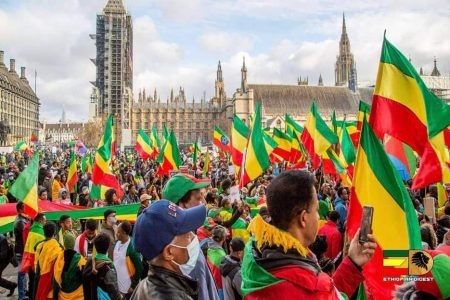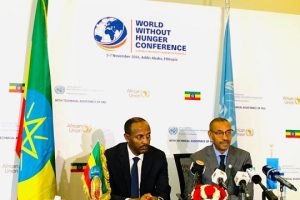
BY MENGESHA AMARE
A number of propaganda have been challenging Ethiopia as of the recent reform was introduced, especially, since the terrorist Tigray People Liberation front (TPLF) triggered a war attacking the Northern Defense Command base shouldering ill-intended mission of regaining power through military steps.
No matter how immense, systematically orchestrated and well reported keeping one another’s pace, the misinformation, fake news and unfounded allegations and attempts to ink Ethiopia in black have been well aborted by the coordinated effort of all Ethiopians residing throughout the universe. The role that Ethiopians at home, from abroad—Ethiopian diaspora, foreigners of Ethiopian origin and Ethiopia’s friends have played among this line is really priceless.
Here, following the increased global access to the Internet and the advent of social media, Ethiopian diplomacy has been irreversibly changed as many, which considered the country as foe have started opening their eyes to look at what is the reality on the ground in this sacred east African part of the world.
When the issue of diplomacy is tabled on the discussion as far as its practice in Ethiopia is concerned, it is simply enough to cite the very recent phenomenon –the case of the 35th ordinary summit of the heads states, which is going to be held as of two days ahead, in early days of February, 2022.
Undeniably, one is tired of listing the conspiracies organized and the futile attempts perplexed and the lies puffed against Ethiopia in a bid to belittle its reputation. So the saying goes, “Truth will triumph at the end,” all wrong doings and evil actions against this great nation have been made inoperable and well aborted thanks to the aforesaid actors. Here, the role of diplomacy, communication and moving in unison have played must be well acknowledge and come to the frontline.
The practice of diplomacy has to be well exercised from an African perspective to underscore the implications of the changing nature of diplomacy on the continent.
Though diplomacy is practiced in Ethiopia by both conventional diplomats like members of the diplomatic corps in ministries of foreign affairs and by other stakeholders in international affairs such as corporate executives and civil society representatives, its practice remains limited on the continent compared to other states of the world.
One of the objectives of flourishing diplomacy is therefore to make countries well informed about the reality, share knowledge; foster people to people relations attain the goal of common agendum and grow together.
The bilateral and multilateral developments witnessed so far in Ethiopia would provide Ethiopia with opportunity for increased discourse about diplomacy in the country by both academics and practitioners alike, with a view to identifying best practices and sharing lessons.
Africa has been on the periphery of the international knowledge structure, including in the governance of all sorts of technologies. Implications for the African Union and continental diplomacy have portrayed transformation as part and parcel of the evolution of diplomatic practice and shined a light on the African Union as the apex institution driving real transformation on the continent.
Ethiopians effort from abroad helps foster diplomacy, reveal reality Ethiopians all over the globe have successfully used social media platforms and other digital tools to advance their country’s diplomacy. Their coordinated move is also bearing fruits.
It is hoped that Ethiopia’s diplomatic move serves as a useful reference point for international relations and diplomacy scholars, diplomats, and other practitioners. Moreover, AU is hoped that its integrated and organized work will act as a call to action for further Africa-focused researches into cardinal diplomacy and its implications for confidently engage in international affairs.
The historic and radical changes, which Ethiopia has been undergoing since the beginning of the recent reform both in its domestic political and social structures as well as in its objective and perceived roles need to be well reinvigorated as they do have a great role to play in getting Ethiopia enlisted in the international arena with radical changes and telling moves.
The current developments in the conduct of the country’s diplomacy are shaped by all of the domestic and international dimensions. Its diplomacy remains dynamic and will continue to evolve and adapt in the years to come.
Nowadays, there is hardly the same need for various forms of unconventional diplomacy as in the old days, since the ‘new’ Ethiopia has potentially faced uncertain challenges as witnessed at various times.
Ethiopia’s increasing involvement in international organizations, conferences, agreements and other crucial interactions would help it to gin out a lot of diplomacy, and all the journey trekked so far are worth noting. Yes, for symbolic and political reasons, Ethiopian foreign policy has been applied accordingly.
Ethiopia is seen as having the standing and the capacity to promote dialogue and interaction between the developed nations on the one hand, while on the other, address the concerns of the developing world that they do not acquire the technology they need for their development. The Ethiopian government, therefore, supports all bilateral and multilateral initiatives fundamentally based on a win-win fashion and respecting common interest.
The diplomacy, Ethiopia has been playing since 1960s is a venerable travel, and it has been deployed troops for peacekeeping mission wherever it is requested, said Ethiopian Permanent mission to the African Union Tesfaye Yilma.
According to Tesfaye, the diplomacy which Ethiopians at home and from abroad have been fueled apart from undertaking rallies condemning undue pressure and meddling in the internal affairs of the country has been used in the implementation of many aspects of Ethiopia’s diplomacy.
Grand Summits, conferences and state visits are however not the only forms of ad hoc diplomacy employed by the country. Many visits, at many different levels, have to be taken place, both of Ethiopian diaspora and citizens at home, he added.
The extensive involvement of the country in multilateral affairs is of paramount importance in helping it draw important lessons from other pertinent countries in all aspects.
He said, “Function-specific as well as diplomatic training are going a long way towards dealing with this, as well as frequent consultations with academics, experts and other members of civil society are potential in paving ways to come up with effective diplomatic journey.”
All the journey Ethiopia has been through would be a great strength in its diplomacy and should be used both at the governmental and non-governmental level, so said Tesfaye. In due course of carrying out national inclusive consultation, making use of academics and experts outside of government in order to value and knowledge as well as expertise to Ethiopia’s diplomacy, have to become increasingly common.
In addition, consideration has to be given to the choice of different forms of diplomacy and their combination could definitely be instrumental in helping countries possess the best choices including ours.
If prioritizing in diplomacy is important, the same certainly holds true for foreign policy. If there is going to be an African Renaissance, it is fairly safe to assume that Ethiopia has taken the lead as it did all in due course of successfully fighting neo-colonialism: the transformed form of imperialism. Yes, it can be part of the driving forces, if not the sole one. The task in the continent of Africa and elsewhere is enormous, but Ethiopia will go a long way to help the African Renaissance happen, he said.
The 35th ordinary summit of the heads of the African Union aims at strengthening its capacity for driving and achieving the goals of Agenda 2063 by providing members with a unique opportunity to reflect on their experience and interaction with the AU. In particular the summit aims to create more awareness and importance of various instruments that are relevant to Agenda 2063, re-examine the role and responsibilities of AU and member states in supporting the Union’s drive towards achieving crucial goals as well as provide all members states with ample opportunities to share and learn from, challenges and success stories.
In his weekly press briefing, Ministry of Foreign Affairs, spokesperson, Ambassador Dina Mufti said, “The African Union decision to convene the 35th AU Summit in Addis Ababa is a grand diplomatic success for Ethiopia.”
According to the spokesperson, Ethiopia has been facing with diplomatic pressure as there have been overriding pressures from various entities and some African countries were urged either to cancel the summit or to host it in a different place under the pretext of Ethiopia’s security situation and COVID-19 pandemic. However, the country has been successful in deterring these pressures through diplomatic efforts and the hosting of the Summit in Addis Ababa reiterates the prevalence of peace and stability in the country.
The independent decision of Africans on various continental issues would allow it foster diplomacy in the years to come.
The various bodies that have to be attributed to all the diplomatic success Ethiopia has been recording so far including the resumption of AU Summit in Addis Ababa include Ethiopians from all walks of life at home, the Ethiopian diaspora, foreigners of Ethiopian origin, Ethiopia’s friends and all the members of Ethiopian security forces, principally the Ethiopian National Defense Force, who has registered the ever shining victory over treason actors, in collaboration with others of course.
The Ethiopian Herald February 1/2022




